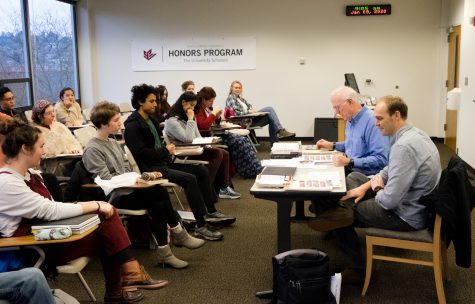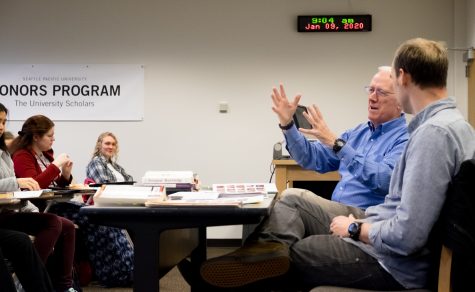New honors program: modern, diverse
January 15, 2020
Come autumn quarter 2020, Seattle Pacific University’s honors program University Scholars will launch a completely revamped curriculum. Spearheaded by Program Director Dr. Christine Chaney, the new program will place a larger emphasis on being accessible to, and inclusive of, all students and on diversifying the curriculum.
The program has been a significant presence at the university since 1969 as a faster-paced alternative to the general education courses that are offered.
Since the creation of the program, the curriculum has stayed relatively the same, offering alternative sequence classes in place of general education classes. The program has not experienced many changes in the last 50 years until recently, when there have been major changes in the way the honors program is sequenced and run.
“It is a complete reboot of the entire program,” Chaney said. “Honors 2.0, for sure.”
These changes, while significant, have been a long time coming.

Faith & Science 1, the only co-taught class in the new Honors Curriculum, meets in the UScholars Lounge in Weter 201 on Thursday, Jan. 9.
In 2012, students brought forward a petition calling for the program’s curriculum to be more diverse and flexible. Students were beginning to drop out of the program due to a lack of interest and schedule availability.
“The program that exists now has been around for 20 or 30 years and so certain things with education and the world have changed,” John Goodhew, one of the junior UScholars program assistants, said.
“There were a lot of feelings that this was starting to get outdated, not necessarily as far as the information that was being taught, but rather that it could be more relevant, modern and globalized.”
The honors program faculty took the students’ advice seriously, and got to work making the students’ requests a reality.
The revisions began in 2012, under previous director Dr. Jeff Keuss, who currently serves as an SPU professor of theology and ministry.
Starting in 2018 under Chaney, the honors faculty began to have workshops, which started the process. In Spring 2019, they presented the major ideas and changes to the Dean’s cabinet.
One such change: before, many classes were co-taught by two professors. In the new curriculum, all classes besides Faith and Science will be led by only one professor. These changes came not only out of student desires, but also out of necessity.
“It became very clear to me, that not only did people want it to change or that should it change, but it had to change because of SPU’s situation with budget cuts,” Goodhew said.
It was important to Chaney that the honors program be more open to all students, and more easily accessible to anyone interested. For that reason, students can now apply at any time, not just as admitted freshmen.
“We don’t want the perception that it’s elitist, or separate … we are creating all kinds of new on-ramps and off-ramps to the program, including to existing students,” Chaney said.
She admitted that the program has been perceived as more exclusive in the past, and she hopes that the new curriculum will break that stigma.
“It’s something wonderful that I feel is too isolated. It’s a wonderful opportunity for any student at SPU and any faculty member from any department, to come and be part of this larger liberal arts question of ‘what does it mean to be human?’”
Senior UScholars program assistant Erinn Campbell said that this new inclusivity is one of the changes she is most excited about.
“My experience in honors has been incredibly valuable, and it’s about time we extend this opportunity to a broader swath of the SPU student body,” Campbell said.

Faith & Science 1, the only co-taught class in the new Honors Curriculum, meets in the UScholars Lounge in Weter 201 on Thursday, Jan. 9.
Chaney explained that honors will be hosting a forum during spring quarter explaining the new curriculum before it launches in Autumn 2020.
One of the biggest changes is the ability for students to tailor the program to their needs. A student can now aim for a major or minor in Honors Liberal Arts, or to just take a few classes.
A Bachelor of Arts would require taking the full program, while the minor is 30 credits and, according to Campbell, “ basically equivalent to the first two years of the program.”
“[This makes it] way easier for transfer students, way easier for people with credit already, and way easier for people who may want to take some classes but maybe don’t want to do an honors thesis because they have other things going on in their lives, other projects,” Chaney explained.
She recognized that students had been leading this movement since the beginning, and it was their ideas driving the change.
“Students started it. It began with the student petition and it has always been lead by student desires. We, faculty, took that really seriously,” Chaney said.
Chaney, alongside the other 14 honors professors and their students, searched for the best ways to integrate SPU’s values into an honors curriculum.
“Honors programs tend to be very campus-specific. There’s loose guidelines, but they all look like the campus they’re a part of,” Chaney explained. “So, we wanted this to look like SPU and be the things that people like about [SPU], which is, especially, its community aspect.”
As such, the curriculum emphasizes service and student leadership, which Chaney and her students see as integral to the university’s campus.
It also makes changes to the structure of classes. They will now focus on themes such as “history and representation,” rather than on historical eras.
“This approach is designed to encourage more focused, in-depth discussions than are really possible when you’re trying to fly through an entire era in ten weeks,” Campbell said.
Chaney and the honors students are excited for the new start and to see the results of the years of research, discussion and revision that led to the new curriculum.
“What I hope is that it is definitely honors for the 21st century,” Chaney said. “[An] interdisciplinary curriculum that speaks to the world we live in and the lives you guys are leading now, instead of something old fashioned.”

























































































